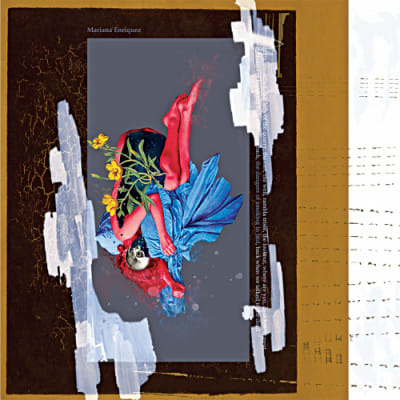Night has brought him something worse: 2021’s first must-read

"The thing was that everyone knew Julita's parents hadn't died in any accident: Julita's folks had disappeared. They were disappeared. They'd been disappeared". Hearsay, superstition, poverty, perverse proclivities, cannibalisms, spirits, animals, public defecation, death, jealousy, coming-of-age, and missing children spatter the 208 pages of Mariana Enríquez's compulsive new collection, The Dangers of Smoking in Bed (Hogarth Press, 2021; transl. Megan McDowell). Encompassing the highest levels of depravity and the lowest depths of humanity, Enríquez's world would be so terribly distressing if it wasn't the refraction of our own.
The Argentine author does exceedingly well in creating a state of oppression and depression that clings long beyond its pages' end, but where she succeeds most is the fine line towed between the axes. Through all the gory and gothic-sticky details of the 12 stories' contents, she never loses her reader. It may not be that the reader has had their own encounters with the walking, pointing, rotting corpse of an infant, as in "Angelita Unearthed", nor is it a prerequisite to have a sensual inclination for pulmonary illnesses, as in the collection's most unsettling tale "Where Are You, Dear Heart?", but when we read these stories we are gripped and we are there, right with the characters, with the largely feminine eyes we see and enact the perversions through. We walk with the characters, and we breathe, uncontrollably, with every step they pace, every thought that can and most probably will bring about some great evil soon.
For all the adjectives and nouns that can be thrown to describe this book, you are just as likely to find The Dangers of Smoking in Bed filed under "general fiction" as you are "horror", or "psychological thriller", and that is nothing if not a testament to the universal nature even its most wildly-imagined stories possess. As in our realities, there is comedy yet in tragedy, and tragedy yet in comedy, and truth and fiction play a muddling, twining game. "Angelita Unearthed", for one, is the collection's most openly humorous, however phantasmic and however real.
Each short crams a world, or more, into a slender few pages, its own idiosyncrasies and bad habits unique. All the stories will take about three to five flips, with the exception of "Kids Who Come Back", the book's haunting centerpiece which, with twice the average length, plods and plots a course of a city plagued with missing children.
Upon reading the book's many highlights readers can only twist their brows at this being only the second English translation of the author's many works. None of her novels or novelettes have seen English publication despite her status as a celebrated author of some thirty years, and the only two, this release and 2017's equally sublime and delirious Things We Lost in the Fire (Hogarth), are both collections of her shorter works.
The Dangers of Smoking Bed, as can be ascertained from its occasional references to MySpace and other bygone institutions, was published originally in Spanish in 2009. If any of the book has been lost in translation, none of it shows. McDowell's translation leaves several words and expressions as they were ("villero", "mamita", "paco") and allows for a fresh, smooth read. I never felt like a tourist, even when having to check and double-check the countless streets and parts of Greater Buenos Aires. Even in the brilliant "Rambla Triste", which sees its Argentine heroine spend the story in Catalonia and in which the only reference I could grasp was that of "a Barça game", I found myself by streets and alleyways and city lights perfectly formed.
Enríquez's latest is an engaging read, grabbing you from near start to finish, with only its title story conceding any real momentum. The book is a many different things—a campfire tale to scare all ages; a parable left on the cutting-room floor; a monochrome portrait of life in bed—but in all its shapes and forms, the stories maintain the author's character, that of the impossibly illusive older sibling; the one with all the cool records, all the experience, and all the right (wrong) friends.
Mehrul Bari S Chowdhury is a writer, poet, and artist. His work has appeared or is forthcoming in Kitaab, Sortes Magazine, and Marías at Sampaguitas, among others.

 For all latest news, follow The Daily Star's Google News channel.
For all latest news, follow The Daily Star's Google News channel. 



Comments